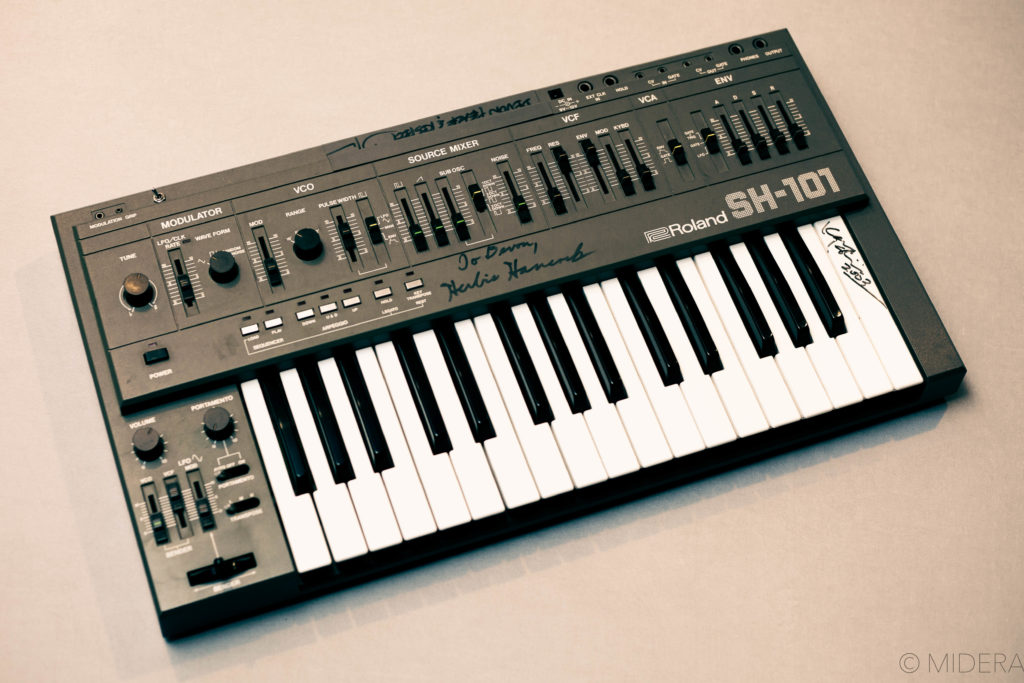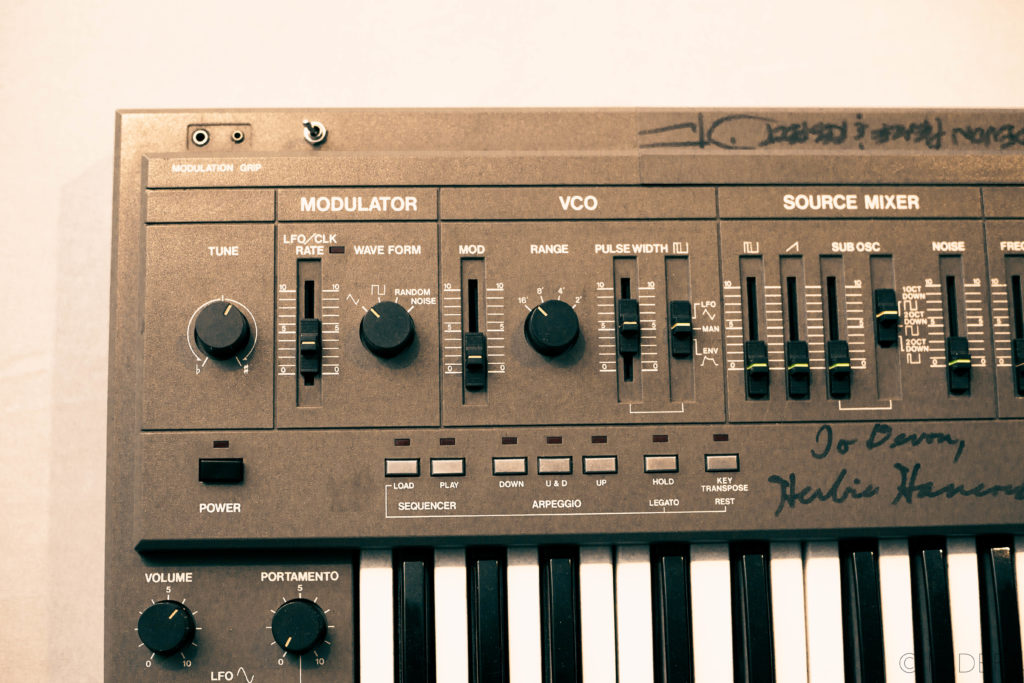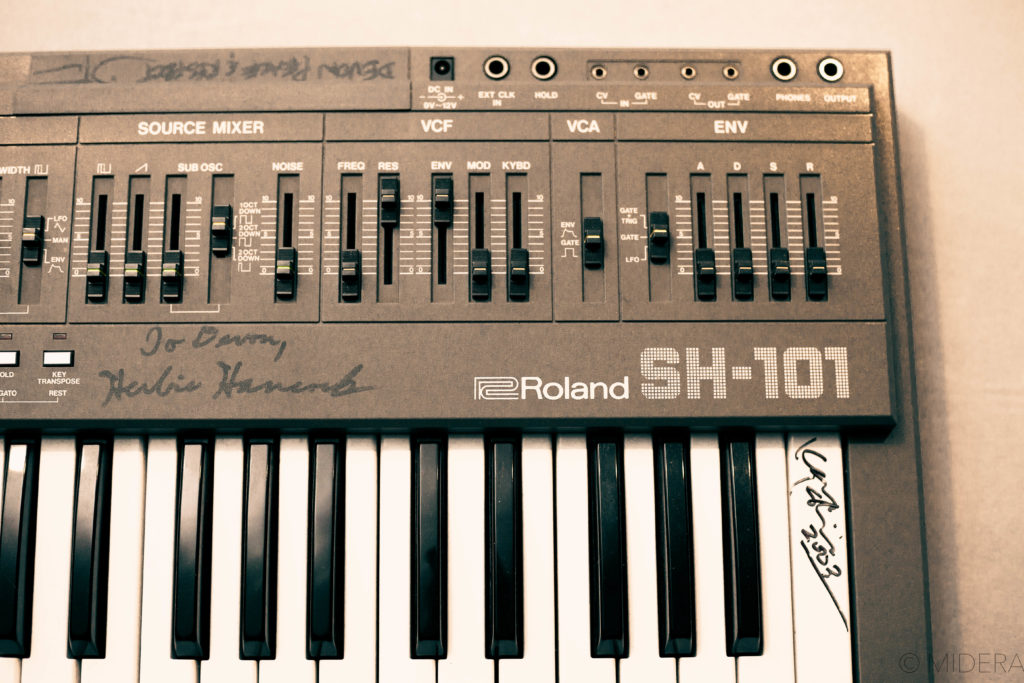To Devon, Herbie Hancock

The history of my Roland SH-101
Yes, my Roland SH-101 has some tattoos (and I don’t mean the cool silkscreen tattoos). So what’s this unit’s history? I bought it from Joe Novak, who owns Midwest Modular in Minneapolis. Apparently, this specific unit was previously owned by a guy named Devon Hughes, who used to work for Elektron although a quick google search shows that he is currently a Toraiz Product Consultant (but I’m not going to log in to LinkedIn to find out), and is on Instagram as Rhythm Droid. Regarding exactly what’s written on this unit, it looks like Herbie Hancock signed it as well as some Swedish acts. I can’t make out what the other two signatures are. One of the signatures may be by “Swedish House Mafia” but neither are completely legible. On the far back, it says “Devon Peace & Respect D F” or at least what appears to be a ‘D.’
And so it passed, that the One Ring has moved on to me, Frodo Baggins. This is sort of what I like about vintage gear, it has a history. And I enjoy being the steward of the gear, for the time being. Hopefully I don’t go down like the last Steward of Gondor. I plan to take better care of the Roland SH-101 than he took care of Minas Tirith. I did contemplate removing the signatures on my SH-101. When I asked a Vintage Synth Repair group on Facebook how to remove the writing, everyone was very derisive and chiding me for even thinking of doing that. “Look at this guy who wants to remove Herbie Hancock’s signature.” Clearly, I was in the wrong for wanting to clean up the SH-101. Is a signature meant for someone else meaningful? Apparently to this group, it was. So of course, I’ve done nothing to it. Also, I have not gone back to ask that Facebook group anything. Tis a silly group anyway.
The sound of the Roland SH-101, and why I love it.
I have no great explanation here, because our responses to sounds are completely subjective. All I can say is that my first introduction to the Roland SH-101 (at least, that I’m wholly aware of), is from the Squarepusher’s Theme From Ernest Borgnine, which just takes me to another place. It’s one of my favorite songs I’ve ever heard. To this day, I have no idea how he managed to sequence the SH-101 to do that exact pattern. If I follow along with someone else who sequences it on YouTube, I have to pause after every key press to figure it out. Was it random or did he know what he was doing? Whatever he did, I am just floored. It just sounds wonderful and reminds me of a late spring day when all the leaves have come out and all the flowers bloomed, riding down the street in a convertible after a strong rain, with no worries in the world. That’s what that song sounds like to me.
Of course, The Roland SH-101 sounds that lovely detached from that song. It’s so incredibly simple, but sounds amazing and has an excellent range of sounds, despite its extremely simple architecture. I think it’s basically a monophonic Juno 6, no? And if it is, in that respect, it does something the Juno’s cannot: mono-mode. Ok, so I just looked it up to see if the Juno’s can go into monophonic mode, and apparently you can get them (unmodded) to play in monophonic unison, seen here. Not to discredit the work of the person who made that video, but I don’t think that sounds good at all. It sounds nothing like an SH-101. All 6 voices stacked on top of each other is too thick. To be fair, I don’t like any unison sound, so obviously this didn’t stand a chance with me. I also don’t like the unison on the Korg Polysix, but at least with the Polysix, you can hold one note down, press ‘chord mode’ and you have an actual monophonic voice. Unfortunately, that doesn’t save with the preset.
Regardless, the sound of the Roland SH-101 is just wonderful. Its envelope is super snappy and musical (can an envelope be musical? Well, I suppose in a way it has a drum like or percussive feel, and that can be quite musical). Closing off the filter, raising the resonance, having a touch of envelope amount on the filter, and having the decay only on, set to about 20%, and I’m just in this sort of great place. Throw on magnificent reverb, and you’ve got paradise.

The sequencer and arpeggiator
This is honestly the last section I am writing, as I originally forgot to include it. Apparently the sequencer is one of the major draws of the Roland SH-101. I am not entirely sure why, considering there aren’t 16 steps to show where you’re at in the sequence. There’s really no good way to know or any way to navigate the sequencer notes (unlike the Roland JX-3P which does have a display for the step you are on). I find that, as a fairly non-academic musician, this makes the sequencer somewhat obtuse to use. I get that it is ‘simple’ and in that respect, fits the theme SH-101, but it’s actually extremely complicated due to these reasons and is why I hardly use it, instead opting to use my Toraiz Squid or Analog Keys as a sequencer to drive it. I think the beauty in it is that you can come up with some very cool polyrhythms accidentally because you can’t see what you’re doing. Adding legato per step or adding a rest, both help to create more interesting sequences, and both are highly useful. It’s just, for me, not the selling point of the Roland SH-101. Further, I wish the arpeggiator had a random mode, where notes pressed would trigger out of sequence (i.e., not in descending, or ascending, or back and forth, in order). The Tubbutec SH-1oh1 mod allows for this behavior, and a host of other features. I talk below about why I haven’t yet done this mod. I understand the appeal of the design of the sequencer and arpeggiator. I just don’t particularly get much use out of them with my workflow.
Why own the Roland SH-101?
Besides what I said above about the sound, I guess there is no real answer to that. Why not own one? Is it necessary to own one? Obviously, it is not necessary to own one. In fact, I deliberated quite a bit whether to buy the SH-101. I have my Radikal Technologies Spectralis 2 which I feel does a good impression of the SH-101. Even more, the Elektron Analog Keys is the reason I sold my Roland SH-01a (which, now that it’s discontinued, I have no doubt will be worth more than my actual Roland SH-101 within a few years). There are a few layers here to unpack, so I guess it’s best to go backwards.
The Roland SH-01a. I actually really liked the form factor and look of this synthesizer. It was pretty cool, but in an odd way, I found it a bit more complicated than it looks. The small screen that displays cryptic words requires the use of the manual to understand what it’s saying. Also, I did hear aliasing, despite the assurance from others that it did not produce any. It’s clear that the SH-01a had some benefits over the SH-101. 1) It has MIDI as stock. Now, I could add MIDI using the Tubbutec SH-1oh1 mod, but haven’t exactly wanted to drill holes in my SH-101 (although you can leave it in the battery compartment, although I don’t really like that idea either). That said, my Analog Keys or Toraiz Squid do a great job of sequencing it using its CV inputs. 2) It’s made of metal. The SH-101 is made of plastic. 3) It has up to 4 voices, which functions even better than Roland’s flagship synthesizer, the System 8, which only allows the SH-101 plugout as a monophonic synthesizer. What led me to part with my SH-01a was that it was fairly small and the Elektron Analog Keys came into my studio and sounded better to me.
Elektron Analog Keys. I plan to have a review of this one, so I’ll be brief. First, I actually still own both of these, and if the Analog Keys was so great (good enough to get me to sell my SH-01a), why did I even bother to buy the SH-101? Well, yes, the Analog Keys has a very convincing Roland SH-101 sound to it. I almost wonder if they used the SH-101 as inspiration. I don’t know the answer to that though. What I can tell you is that it’s sequencer is incredible, it sounds great, and I really don’t have many qualms about it. The reason I got the Roland SH-101 was: I got it for the great price of $600 USD in 2020 (what I would consider half of its market value at the time). And unlike the Korg Polysix, I haven’t had to spend two times that on repairs (without including labor).
Radikal Technologies Spectralis 2. I also plan to review this. It definitely has the sound of the SH-101, and it has 4 oscillators. However, it certainly isn’t as hands on and lacks the ability to glide individual tied notes like the SH-101. In these two regards, it isn’t at all similar. The oscillators are also completely digital, although this doesn’t bother me (the filters, of which there are two, are analog). Apart from sharing some core basic sounds, the Spectralis and SH-101 completely differ in philosophies. If I could only have one, it would have to go to the Spectralis because of everything else it can do. This is no slam against the SH-101, it’s just that the Spectralis is the last device I’d ever want to part with.
Behringer MS-1. I don’t have much experience with this clone of the Roland SH-101. It sounds pretty close to the SH-101 from what I heard, but it also seems to fail in one major aspect (again, from what I have heard only on YouTube). And that is that the filter resonance doesn’t seem to peak at inharmonic frequencies, which the SH-101 does to give it a sparkly sound. In that way, the MS-1 filter resonance sounds ‘hollow’ comparatively. See for yourself in this video by loopop.
Novation Bass Station II. From my very brief time with the BS2, I thought it sounded great. I don’t know if it is a perfect clone, nor would I care. Since I wouldn’t spend $1200+ on a Roland SH-101, and didn’t want to get an Elektron Analog Four or Keys, I would get the BS2 instead. I think it sounds and looks good.
I am sure there are other clones or alternatives worth considering. I don’t personally have any knowledge or interest in them, so if you do, please leave a comment below!

Concluding remarks
I think I’ve actually said all I need to say about the Roland SH-101. I describe it as ‘wonderful’ in all ways. It’s wonderfully simple, it sounds wonderful, and it looks wonderful (even the grey version, as much as I’d love the blue version, it has an almost 1980’s Soviet design element). It does what it does, and it does what it does well. I can’t ask for more, because it provides what it needs to. For that, I must thank the 1980’s Roland company, Devon and Joe for caring for it, and Herbie Hancock for signing it.
Great review! I would love to own one some day. Herbie is a personal hero of mine, it’s so cool you have this unique piece and are safeguarding it for future generations.
Hey, I’m Devon. Thanks for writing such a thorough and cool review of the SH-101! The illegible signatures are from Ken Ishii and BT. 😃